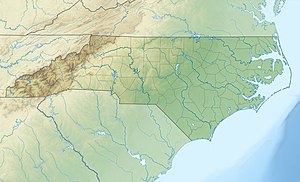Mill Run (Trent River tributary)
| Mill Run Tributary to Trent River | |
|---|---|
| Location | |
| Country | United States |
| State | North Carolina |
| County | Jones |
| Physical characteristics | |
| Source | Crooked Run divide |
| • location | about 1 mile southwest of Olivers Crossroads, North Carolina |
| • coordinates | 35°00′24″N 077°19′57″W / 35.00667°N 77.33250°W[1] |
| • elevation | 40 ft (12 m)[2] |
| Mouth | Trent River |
• location | about 2 mile southeast of Olivers Crossroads, North Carolina |
• coordinates | 35°00′44″N 077°16′25″W / 35.01222°N 77.27361°W[1] |
• elevation | 3 ft (0.91 m)[3] |
| Length | 3.52 mi (5.66 km)[4] |
| Basin size | 11.84 square miles (30.7 km2)[5] |
| Discharge | |
| • location | Trent River |
| • average | 17.69 cu ft/s (0.501 m3/s) at mouth with Trent River[5] |
| Basin features | |
| Progression | generally northeast[4] |
| River system | Neuse River |
| Tributaries | |
| • left | unnamed tributaries |
| • right | Beaverdam Branch |
| Bridges | Olivers Cross Road, Davis Field Road, NC 58 |
Mill Run is a 3.52 mi (5.66 km) long 2nd order tributary to the Trent River in Jones County, North Carolina.
Course[edit]
Mill Run rises about 1 mile southwest of Olivers Crossroads, North Carolina and then flows northeast to join the Trent River about 1 mile southeast of Olivers Crossroads.[3]
Watershed[edit]
Mill Run drains 11.84 square miles (30.7 km2) of area, receives about 54.0 in/year of precipitation, has a wetness index of 617.78, and is about 18% forested.[5]
See also[edit]
References[edit]
- ^ a b "GNIS Detail - Mill Run". geonames.usgs.gov. US Geological Survey. Retrieved 24 December 2020.
- ^ "Get Maps". USGS Topoview. US Geological Survey. Retrieved 24 December 2020.
- ^ a b "Get Maps". USGS Topoview. US Geological Survey. Retrieved 22 December 2020.
- ^ a b "ArcGIS Web Application". epa.maps.arcgis.com. US EPA. Retrieved 24 December 2020.
- ^ a b c "Mill Run Watershed Report". US EPA Geoviewer. US EPA. Retrieved 24 December 2020.


